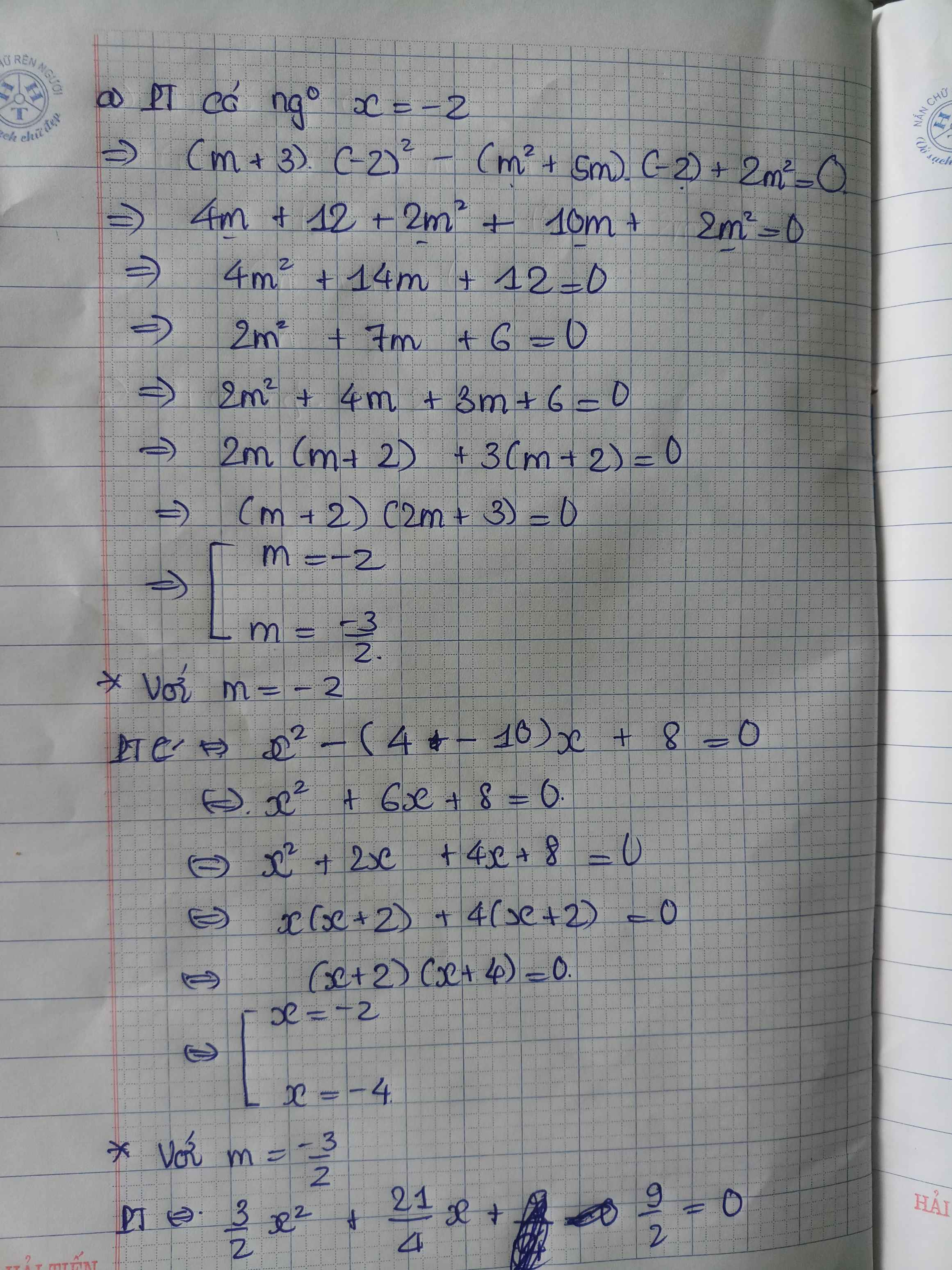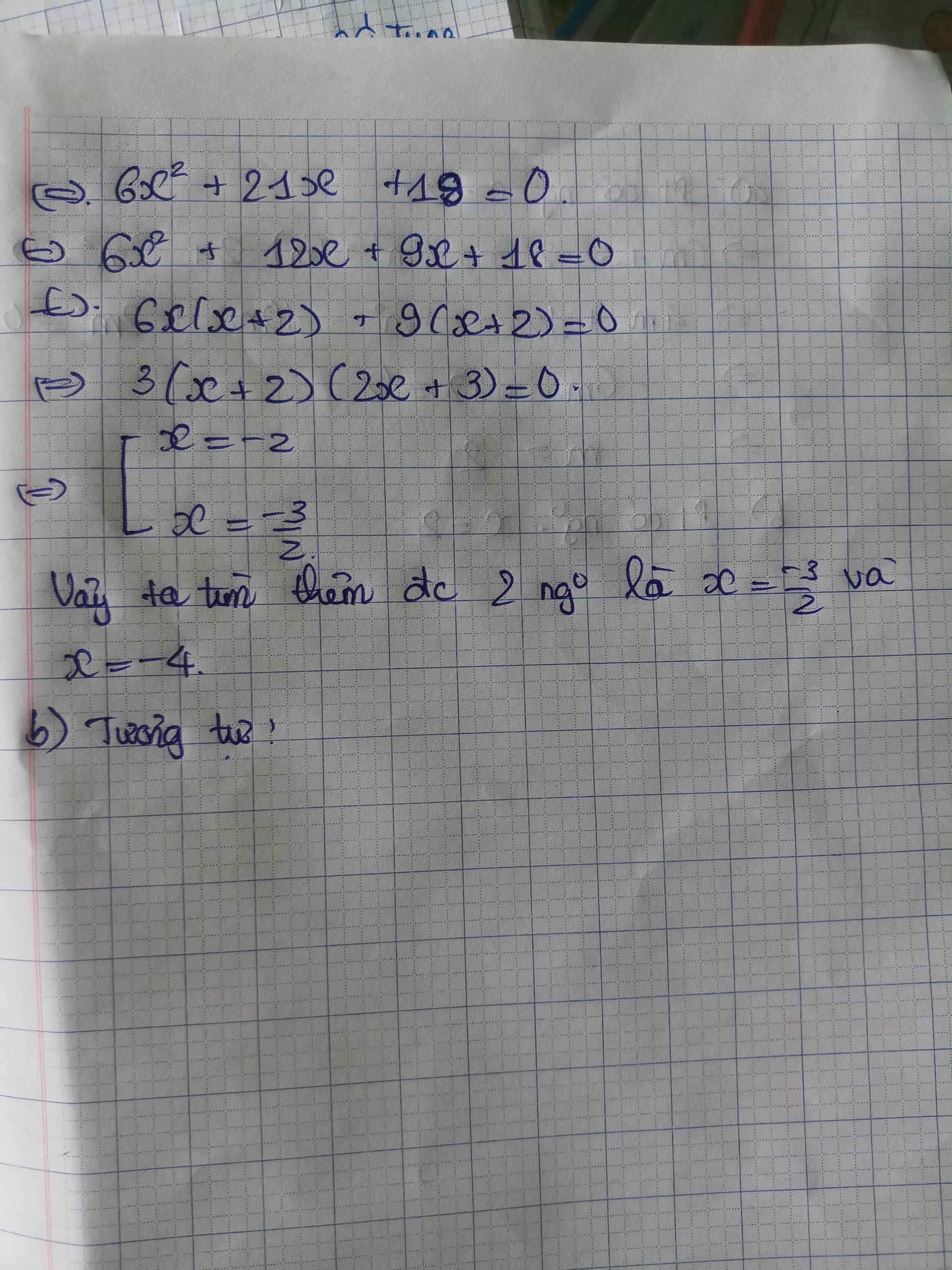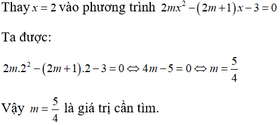Tìm m để phương trình \(^{x^2}\)- (2m+3)x+\(m^2\)-2m+2=0 có nghiệm
Hãy nhập câu hỏi của bạn vào đây, nếu là tài khoản VIP, bạn sẽ được ưu tiên trả lời.



a)PT có 2 nghiệm phân biệt
`<=>Delta>0`
`<=>(2m+3)^2+4(2m+4)>0`
`<=>4m^2+12m+9+8m+16>0`
`<=>4m^2+20m+25>0`
`<=>(2m+5)^2>0`
`<=>m ne -5/2`
b)Áp dụng vi-ét:
$\begin{cases}x_1+x_2=2m+3\\x_1.x_2=-2m-4\\\end{cases}$
`|x_1|+|x_2|=5`
`<=>x_1^2+x_2^2+2|x_1.x_2|=25`
`<=>(x_1+x_2)^2+2(|x_1.x_2|-x_1.x_2)=25`
`<=>(2m+3)^2+2[|-2m-4|-(-2m-4)]=25`
Với `-2m-4>=0<=>m<=-2`
`=>pt<=>(2m+3)^2-25=0`
`<=>(2m-2)(2m+8)=0`
`<=>(m-1)(m+4)=0`
`<=>` $\left[ \begin{array}{l}x=1\\x=-4\end{array} \right.$
`-2m-4<=0=>m>=-2=>|-2m-4|=2m+4`
`<=>4m^2+12m+9+8m+16=25`
`<=>4m^2+20m=0`
`<=>m^2+5m=0`
`<=>` \left[ \begin{array}{l}x=0\\x=-5\end{array} \right.$
Vậy `m in {0,1,-4,-5}`

a: \(\Leftrightarrow\left(2m-4\right)^2-4\left(m^2-3\right)>=0\)
\(\Leftrightarrow4m^2-16m+16-4m^2+12>=0\)
=>-16m>=-28
hay m<=7/4
b: \(\Leftrightarrow16m^2-4\left(2m-1\right)\left(2m+3\right)=0\)
\(\Leftrightarrow16m^2-4\left(4m^2+4m-3\right)=0\)
=>4m-3=0
hay m=3/4
c: \(\Leftrightarrow\left(4m-2\right)^2-4\cdot4\cdot m^2< 0\)
=>-16m+4<0
hay m>1/4

b: x1=3x2 và x1+x2=2m-2
=>3x2+x2=2m-2 và x1=3x2
=>x2=0,5m-0,5 và x1=1,5m-1,5
x1*x2=-2m
=>-2m=(0,5m-0,5)(1,5m-1,5)
=>-2m=0,75(m^2-2m+1)
=>0,75m^2-1,5m+0,75+2m=0
=>\(m\in\varnothing\)
c: x1/x2=3
x1+x2=2m-2
=>x1=3x2 và x1+x2=2m-2
Cái này tương tự câu b nên kết quả vẫn là ko có m thỏa mãn

a: \(x^2+\left(2m+1\right)x+m^2-3=0\)
\(\text{Δ}=\left(2m+1\right)^2-4\left(m^2-3\right)\)
\(=4m^2+4m+1-4m^2+12=4m+13\)
Để phương trình có nghiệm kép thì 4m+13=0
=>\(m=-\dfrac{13}{4}\)
Thay m=-13/4 vào phương trình, ta được:
\(x^2+\left(2\cdot\dfrac{-13}{4}+1\right)x+\left(-\dfrac{13}{4}\right)^2-3=0\)
=>\(x^2-\dfrac{11}{2}x+\dfrac{121}{16}=0\)
=>\(\left(x-\dfrac{11}{4}\right)^2=0\)
=>x-11/4=0
=>x=11/4
b: TH1: m=2
Phương trình sẽ trở thành \(\left(2+1\right)x+2-3=0\)
=>3x-1=0
=>3x=1
=>\(x=\dfrac{1}{3}\)
=>Khi m=2 thì phương trình có nghiệm kép là x=1/3
TH2: m<>2
\(\text{Δ}=\left(m+1\right)^2-4\left(m-2\right)\left(m-3\right)\)
\(=m^2+2m+1-4\left(m^2-5m+6\right)\)
\(=m^2+2m+1-4m^2+20m-24\)
\(=-3m^2+22m-23\)
Để phương trình có nghiệm kép thì Δ=0
=>\(-3m^2+22m-23=0\)
=>\(m=\dfrac{11\pm2\sqrt{13}}{3}\)
*Khi \(m=\dfrac{11+2\sqrt{13}}{3}\) thì \(x_1+x_2=\dfrac{-m-1}{m-2}=\dfrac{2-2\sqrt{13}}{3}\)
=>\(x_1=x_2=\dfrac{1-\sqrt{13}}{3}\)
*Khi \(m=\dfrac{11-2\sqrt{13}}{3}\) thì \(x_1+x_2=\dfrac{-m-1}{m-2}=\dfrac{2+2\sqrt{13}}{3}\)
=>\(x_1=x_2=\dfrac{1+\sqrt{13}}{3}\)
c: TH1: m=0
Phương trình sẽ trở thành
\(0x^2-\left(1-2\cdot0\right)x+0=0\)
=>-x=0
=>x=0
=>Nhận
TH2: m<>0
\(\text{Δ}=\left(-1+2m\right)^2-4\cdot m\cdot m\)
\(=4m^2-4m+1-4m^2=-4m+1\)
Để phương trình có nghiệm kép thì -4m+1=0
=>-4m=-1
=>\(m=\dfrac{1}{4}\)
Khi m=1/4 thì \(x_1+x_2=\dfrac{-b}{a}=\dfrac{-\left[-1+2m\right]}{m}=\dfrac{-2m+1}{m}\)
=>\(x_1+x_2=\dfrac{-2\cdot\dfrac{1}{4}+1}{\dfrac{1}{4}}=\dfrac{-\dfrac{1}{2}+1}{\dfrac{1}{4}}=\dfrac{1}{2}:\dfrac{1}{4}=2\)
=>\(x_1=x_2=\dfrac{2}{2}=1\)

b) Thay x=2 vào pt, ta được:
\(4\left(m^2-1\right)-4m+m^2+m+4=0\)
\(\Leftrightarrow4m^2-4-4m+m^2+m+4=0\)
\(\Leftrightarrow5m^2-3m=0\)
\(\Leftrightarrow m\left(5m-3\right)=0\)
\(\Leftrightarrow\left[{}\begin{matrix}m=0\\m=\dfrac{3}{5}\end{matrix}\right.\)
Áp dụng hệ thức Vi-et, ta được:
\(x_1+x_2=\dfrac{2m}{m^2-1}\)
\(\Leftrightarrow\left[{}\begin{matrix}x_2+2=0\\x_2+2=\dfrac{6}{5}:\left(\dfrac{36}{25}-1\right)=\dfrac{30}{11}\end{matrix}\right.\Leftrightarrow\left[{}\begin{matrix}x_2=-2\\x_2=\dfrac{8}{11}\end{matrix}\right.\)

a: \(\Leftrightarrow\left(2m+1\right)^2-4\left(m^2-3\right)=0\)
\(\Leftrightarrow4m^2+4m+1-4m^2+12=0\)
=>4m=-13
hay m=-13/4
c: \(\Leftrightarrow\left(2m-2\right)^2-4m^2>=0\)
\(\Leftrightarrow4m^2-8m+4-4m^2>=0\)
=>-8m>=-4
hay m<=1/2


